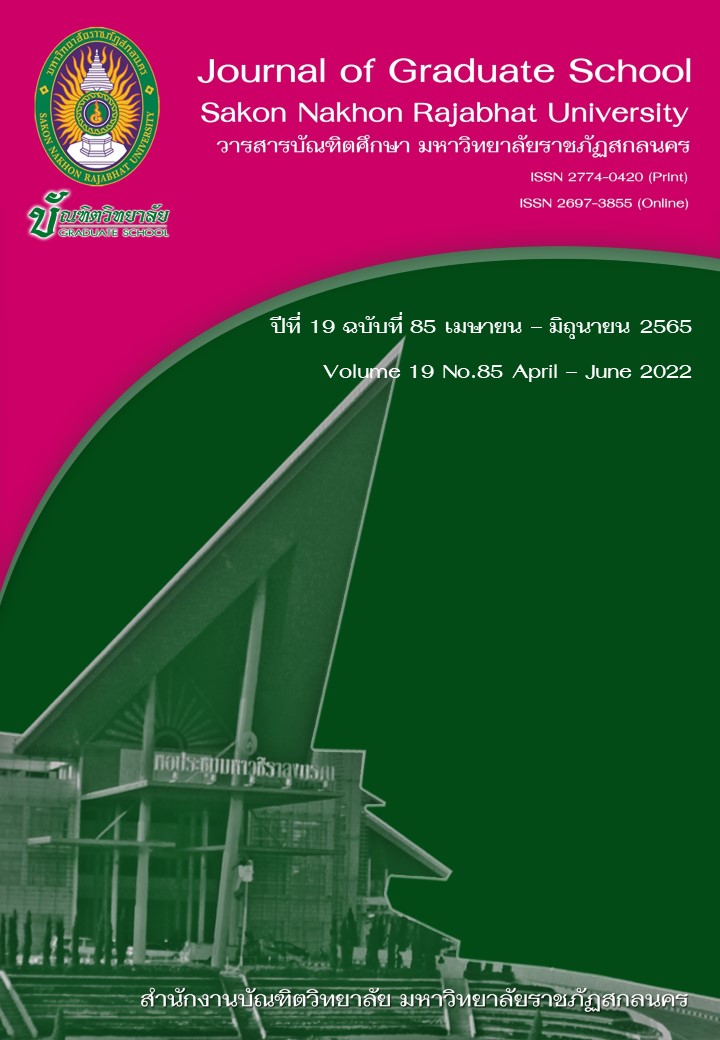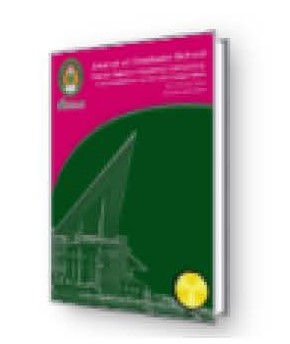การพัฒนาทักษะวิจัยสำหรับครูอาชีวศึกษา สาขาคหกรรม
คำสำคัญ:
ทักษะวิจัย, ครูอาชีวศึกษาบทคัดย่อ
การวิจัยนี้มีวัตถุประสงค์เพื่อพัฒนาแผนการจัดการเรียนรู้ในการพัฒนาทักษะวิจัยสำหรับครูอาชีวศึกษา สาขาคหกรรม และเพื่อศึกษาผลที่เกิดกับผู้เรียนจากการใช้แผนการจัดการเรียนรู้ฯ โดยเป็นการวิจัยและพัฒนา แบ่งเป็น 5 ระยะคือ 1) ศึกษาแนวคิด ทฤษฎี 2) พัฒนาแผนการจัดการเรียนรู้ฯ 3) ทดลองใช้แผนการจัดการเรียนรู้ฯ 4) การติดตามและประเมินผล และ 5) ปรับปรุงแผนการจัดการเรียนรู้ฯ กลุ่มตัวอย่างคือ ครูอาชีวศึกษา สาขาคหกรรม จำนวน 20 คน และนักศึกษาชั้นปีที่ 5 สาขาคหกรรมศาสตร์ศึกษา จำนวน 30 คน โดยการคัดเลือกแบบอาสาสมัคร ผลการวิจัยพบว่า 1) แผนการจัดการเรียนรู้จำนวน 2 แผน รวมเวลา 16 ชั่วโมง ผลการประเมินคุณภาพแผนการจัดการเรียนรู้ จากผู้ทรงคุณวุฒิ พบว่า ภาพรวมอยู่ในระดับดี (= 4.17, S.D. = 0.75) เมื่อพิจารณารายด้านพบว่า ด้านจุดประสงค์การเรียนรู้มีค่าเฉลี่ยสูงสุด (
= 4.39, S.D. = 0.33) รองลงมาคือ ด้านการวัดและประเมินผล (
= 4.24, S.D. = 0.84) และด้านกิจกรรมการเรียนรู้ (
= 4.17, S.D. = 0.96) และ 2) ผลที่เกิดกับผู้เรียนจากการใช้แผนการจัดการเรียนรู้ฯ พบว่า ทางด้านทักษะวิจัย คุณภาพงานวิจัยในภาพรวมคะแนนเฉลี่ยอยู่ในระดับดี (78.50%) ด้านที่มีค่าเฉลี่ยสูงสุด คือ 1) วิธีดำเนินการวิจัย (85.80%) 2) บทนำ (81.57%) และ 3) การกำหนดหัวข้อ ประเด็นปัญหา (81.25%) สำหรับการประเมินตนเองภายหลังการเข้าร่วมโครงการฯ พบว่า ในภาพรวมมีค่าเฉลี่ยอยู่ในระดับมาก (
= 4.11, S.D. = 0.73) โดยด้านความสำคัญ และคุณค่าของการวิจัยมีค่าเฉลี่ยสูงสุด (= 4.19, S.D.=0.89) รองลงมา คือ ด้านเจตคติต่อการวิจัย (
= 4.16, S.D.=0.63) อันดับสามคือ ด้านความรู้ (
= 4.06, S.D.=0.84) และด้านพฤติกรรมที่เปลี่ยนแปลงไปหลังการเข้าร่วมโครงการฯ (
= 4.06, S.D.=0.74)
เอกสารอ้างอิง
กระทรวงศึกษาธิการ. (2546). พระราชบัญญัติการศึกษาแหงชาติ. พ.ศ. 2542 และที่แกไขเพิ่มเติม (ฉบับที่ 2) พ.ศ. 2545. กรุงเทพฯ: โรงพิมพคุรุสภาลาดพราว.
กลุ่มเทคโนโลยีสารสนเทศเพื่อการบริหารงานอาชีวศึกษา. (2564). จำนวนนักเรียนภาครัฐและเอกชนรายประเภทวิชาปีการศึกษา 2560-2564. เข้าถึงจาก. https://techno.vec.go.th/. 20 กรกฎาคม 2564.
จตุพล รูปเตี้ย และสําเร็จ ยุรชัย. (2563). ความต้องการจําเป็นในการส่งเสริมการทําวิจัยในชั้นเรียนของครูผู้สอน สังกัดอาชีวศึกษาจังหวัดขอนแก่น.วารสารพุทธปรัชญาวิวัฒน์, 4(1), 29-42
จุฑา ธรรมชาติ. (2560). ผลการสอนปฏิบัติการตามแนวคิดวิจัยเป็นฐานที่มีต่อทักษะพื้นฐานทางการวิจัย และเจตคติต่อการวิจัยของนักศึกษาคณะศึกษาศาสตร์ มหาวิทยาลัยสงขลานครินทร์ วิทยาเขตปัตตานี. วารสารวิทยบริการ มหาวิทยาลัยสงขลานครินทร์, 7(2), 64-72.
ชวลิต เตมียะกุล. (2552). รูปแบบการพัฒนาสมรรถนะทางการวิจัยของครู สังกัดสำนักงานคณะกรรมการการอาชีวศึกษา. กรุงเทพฯ: มหาวิทยาลัยเทคโนโลยีพระจอมเกล้าพระนครเหนือ.
บุญชม ศรีสะอาด. (2550). วิธีการทางสถิติสำหรับการวิจัย. กาฬสินธุ์: โรงพิมพ์ประสานการพิมพ์.
พัชราภรณ์ ทัพมาลี และ คณะ. (2564). การวิจัยประเมินความต้องการจําเป็นด้านการถ่ายโยงการเรียนรู้ด้านการวิจัยปฏิบัติการในชั้นเรียนของครู. วารสารการวัดผลการศึกษา มหาวิทยาลัยมหาสารคาม, 27(1), 202-219.
พิมฉัตร์ ฤกษ์รัตน์ระพี. (2563). การพัฒนารูปแบบการฝึกอบรมสมรรถภาพการวิจัยของครูอาชีวศึกษาภาคเอกชนด้วยการเสริมพลังอำนาจแบบมีส่วนร่วม. วารสารวิชาการมหาวิทยาลัยอีสเทิร์นเอเชีย ฉบับสังคมศาสตร์และมนุษยศาสตร์, 10(3), 172-186.
พิมพ์ปวีณ์ สุวรรณโณ และ ศุภลักษณ์ สินธนา. (2561). การศึกษาผลสัมฤทธิ์ทางการเรียนและทักษะการวิจัยของนักศึกษาชั้นปีที่ 4 มหาวิทยาลัยราชภัฏยะลาที่เรียนด้วยการจัดการเรียนการสอนโดยใช้การวิจัยเป็นฐาน. วารสารมหาวิทยาลัยราชภัฏยะลา, 13(1), 161-170.
ภัทราพร เกษสังข์ และ คณะ. (2561). สมรรถนะและการประเมินความต้องการจำเป็นเพื่อพัฒนาวิชาชีพครูในศตวรรษที่ 21 ของครูกลุ่มสาระการเรียนรู้สังคมศึกษา ศาสนาและวัฒนธรรมจังหวัดเลย. วารสารวิจัยมหาวิทยาลัยเทคโนโลยีราชมงคลศรีวิชัย, 11(1), 132-145.
สมชัย เทพสมบัติ และ คณะ. (2563). ยุทธศาสตร์การพัฒนาสมรรถนะด้านการวิจัยของครูในวิทยาลัยครูปากเซสาธารณรัฐประชาธิปไตยประชาชนลาว. วารสารสันติศึกษาปริทรรศน์ มจร, 8(4), 1380-1393.
สำนักงานคณะกรรมการการอาชีวศึกษา. (2560). วิสัยทัศน์และยุทธ์ศาสตร์การพัฒนาอาชีวศึกษา. กรุงเทพฯ: สำนักนโยบายและแผน.
สำนักงานคณะกรรมการการอาชีวศึกษา. (2562). แผนยุทธศาสตร์การอาชีวศึกษา (พ.ศ. 2562-2571). กรุงเทพฯ: พิมพ์ดี.
สุทธิพงศ์ บุญผดุง (2561). การพัฒนารูปแบบการจัดการเรียนรู้ที่ส่งเสริมความสามารถด้านการคิดวิเคราะห์วิชาคณิตศาสตร์ของนักเรียนชั้นมัธยมศึกษาตอนต้น. วารสารมนุษยศาสตร์และสังคมศาสตร์บัณฑิตวิทยาลัย มหาวิทยาลัยราชภัฏพิบูลสงคราม, 12(1), 218-236.
สุรศักดิ์ แซ่เอี้ยน และ คณะ. (2559). การศึกษาอิทฺธิพลของความสามารถในการวิจัย แรงจูงใจในการทำวิจัย และกระบวนการสนับสนุนจากโรงเรียนต่อความต่อเนื่องของการวิจัยของครู: การประยุกต์ใช้โมเดลพื้นผิวการตอบสนอง. วารสารวิธีวิทยาการ วิจัย, 29(2), 157-181.
สุวรรณ พรมเขต. (2558). แรงจูงใจในการพัฒนาตนเองด้านการทำวิจัยของบุคลากรสายวิชาการ มหาวิทยาลัยเทคโนโลยีราชมงคลศรีวิชัย. วารสารวิจัยมหาวิทยาลัยเทคโนโลยีราชมงคลศรีวิชัย, 7(2), 68-80.
สุวิธิดา จรุงเกียรติกุล. (2558). การนำเสนอแนวทางการจัดการศึกษาตลอดชีวิตเพื่อขับเคลื่อนชุมชนการเรียนรู้ในบริบทสังคมและวัฒนธรรมของประเทศไทย. กรุงเทพฯ: จุฬาลงกรณ์มหาวิทยาลัย.
อุทัย อินทะนาม และ สำราญ กำจัดภัย. (2560). การพัฒนาหลักสูตรฝึกอบรมครูโดยใช้โรงเรียนเป็นฐานเพี่อส่งเสริมการทำวิจัยปฏิบัติการในชั้นเรียน: กรณีศึกษาโรงเรียนบ้านบ่อพนา สังกัดสำนักงานเขตพื้นที่การศึกษาประถมศึกษาบึงกาฬ. วารสารศิลปากรศึกษาศาสตร์วิจัย, 9(1), 229-242.
Barrows, H.S., (2000). Problem based learning applied to medical education. Springfield IL: Southern Illinois University Press.
Billings, E. M. H et al. (2013). Teaching with the Mathematical Practices in Mind. Mathematics Teaching in the Middle School, 19(2), 100-107.
Breckler, Robert L. (1986). The Social Work Dictation. (3rd ed.). Washington DC.: Nasw Press.
Ferrance, E. (2000). Action research. Retrieved from: http://www.alliance.brown.edu/pubs/themes_ed/act_research.pdf. July 5th, 2020.
Good, Carter V. (1973). Dictionary of Education. New York: McGraw-Hill Book.
Locke, E.A. & Latham, G.P. (1990). A Theory of Goal Setting and Task Performance. Englewood Cliffs, NJ: Prentice-Hall.
Maslow, A. H. (1954). Motivation and Personality. New York: Harper and Brother.
McNiff, J. & Whitehead, J. (2011). All you need to know about action research. (2nd ed.). California, CA: Sage Publications.
Nugent, G. et al. (2012). A practical guide to action research for literacy educators. Washington, DC 2001, USA: International Reading Association; Nokia Corporation; Pearson Foundation.
Phillips, D. K., & Carr, K. (2014). Becoming a teacher through action research (3rd ed.). Oxford: Routledge. Canadian.
Robbins, Stephen P. (1996). Organizational Behavior: Concepts, Controversies, Applications. Prentice Hall.
Silvia A. et al. (2018). Holistic Approaches to Develop Sustainability and Research Competencies in Pre-Service Teacher Training. Sustainability, 10(10), 1-20.
Willison J, (2008). Multiple Contexts, Multiple Outcomes, One Conceptual Framework for Research Skill Development in the Undergraduate Curriculum. C o u n c i l o n U n d e r g r a d u a t e R e s e a r c h., 29(3), 10-14.
Willison J. (2016). PhD prepared: research skill development across the undergraduate years. International Journal for Researcher Development, 7(1), 63-83.
Yeni Y. et al (2018). The Effect of Professional Education and Training for Teachers (PLPG) in Improving Pedagogic Competence and Teacher Performance. Tadris: Jurnal Keguruan dan Ilmu Tarbiyah, 3(2), 123-130.
ดาวน์โหลด
เผยแพร่แล้ว
รูปแบบการอ้างอิง
ฉบับ
ประเภทบทความ
สัญญาอนุญาต
ลิขสิทธิ์ (c) 2022 วารสารบัณฑิตศึกษา มหาวิทยาลัยราชภัฏสกลนคร

อนุญาตภายใต้เงื่อนไข Creative Commons Attribution-NonCommercial-NoDerivatives 4.0 International License.
บทความทุกบทความที่ตีพิมพ์ในวารสารบัณฑิตศึกษา มหาวิทยาลัยราชภัฏสกลนคร ถือว่าเป็นลิขสิทธิ์ของบัณฑิตวิทยาลัย มหาวิทยาลัยราชภัฏสกลนคร






